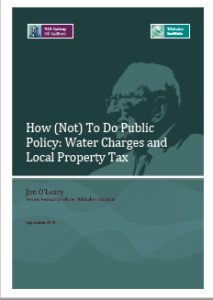How (Not) To Do Public Policy: new report on the water charges debacle
The Whitaker Institute will host a conference today on ‘How (Not) To Do Public Policy’, and launches a report of the same name which examines and compares the failure of water charges and the success of the Local Property Tax in Ireland. The conference will gather senior policymakers, public servants, academics, and other experts to evaluate the strengths and weaknesses of the policy-making process in Ireland with a view to suggesting how the quality of policy-making might be improved, including how policies are conceived, designed, implemented, communicated, and reviewed.
The new report, meticulously researched and based on exceptional access to senior policymakers, looks back forensically at a recent policy success, the Local Property Tax (LPT) and a recent policy failure, water charges, and explores what it was about the policy-making process in each case that contributed to success or failure. The aim of the report is to better understand this recent episode in the history of public administration in Ireland and to extract appropriate lessons for policy-making.
Key findings from the research in relation to the relative success of the Local Property Tax versus the failure to introduce water charges:
- The over-arching goal of the water sector reform programme was to establish a water utility that could independently borrow to finance a heavy programme of investment in water infrastructure. For this to happen, the water utility had to be classified outside the general government sector by passing the so-called ‘Eurostat test’. This was a treacherous basis for policy.
- Policy choices such as the universal free allowance and universal metering were made before their implications were properly understood and without the alternatives being rigorously assessed.
- There was a serious disconnect between policy design and implementation.
- The Local Property Tax was successfully introduced because its design was infused with a keen awareness of the importance of anticipating implementation challenges. In this regard, a key moment was the decision to give responsibility for collection and administration to the Revenue Commissioners.


